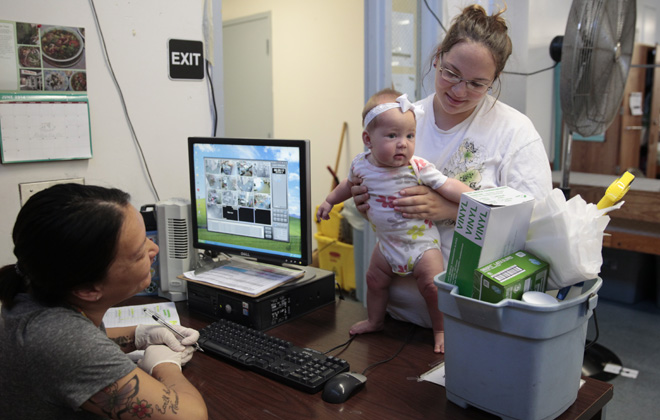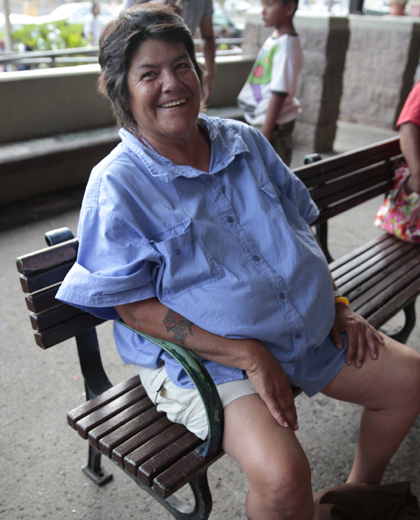Many down-on-their-luck visitors seek paradise, find homelessness

Alyssa Miller, a 23-year-old guest at the Institute for Human Services shelter, stops to talk story with Wendy Dumlao, an IHS guest services assistant, before heading out for morning activities with her 9-month-old child, Kelsey Stabler. Dumlao helped keep watch over the young family as they slept through the night.

Joy Eshleman, 50, is from California but loves Hawaii so much that she has the state’s name tattooed on her arm. Eshleman is one of many mainlanders who came to Hawaii unprepared for the high cost of living. Expecting to realize a dream of paradise, they have instead been caught in the reality of homelessness.


Alyssa Miller, 23, croons an impromptu lullaby to her 9-month-old baby, Kelsey, before the nightly lights out at the Institute for Human Services Family Shelter.
"Some beach, somewhere. There’s a beautiful sunset burning up that atmosphere. There’s music and dancing and lovers romancing in the salty evening air on some beach somewhere," Miller sings along wistfully as the popular Blake Shelton country tune, "Some Beach," plays on her cellphone.
Miller, who is from LeRoy, N.Y., expected to find a paradise in Hawaii when she traveled here to try to reconcile with her military ex-husband, who she said had forced her to give up custody of their now 6-year-old son, Jacob. The couple conceived Kelsey, who was born in November, before an alleged domestic violence incident left the young mother alone with inadequate support to care for her two children. Her ex-husband returned to the mainland.
Child Protective Services "opened up a case against him," she said. "I have custody of Kelsey but I can’t leave Hawaii until the court awards me custody of Jacob."
Facing homelessness, Miller moved herself and her children into IHS’ family shelter in January. She’s one of a growing number of mainlanders who have come to Honolulu in search of sunshine and a better life only to wind up homeless on the streets or in a shelter. Last year, state Homeless Coordinator Colin Kippen said that lousy mainland weather contributed to a slight uptick in Waikiki’s homeless population. Along the same trend lines, from July 2013 to June 18, IHS reported that 15 percent, or 174, of the 1,156 adult guests who stayed at their shelter had spent less than a year in Hawaii. And, in the last three months, IHS has received about 50 requests from mainlanders wanting to reserve shelter space, said IHS Executive Director Connie Mitchell.
"I always write back telling them not to come because Hawaii is a very difficult place to make it if you don’t have any resources," Mitchell said. "It’s mind-boggling. We aren’t meant to be someone’s primary plan."
Don't miss out on what's happening!
Stay in touch with breaking news, as it happens, conveniently in your email inbox. It's FREE!
Despite the discouraging reception, many mainlanders come anyway, only to wind up on the streets or in a homeless shelter when life becomes more challenging than they expected. While domestic troubles unsettled Miller, others commonly face problems coping with the state’s high cost of living while struggling to find good-paying jobs and affordable housing.
"It’s crazy, but there are people who draw benefits from out of state to maintain a homeless lifestyle here," said Kimo Carvalho, IHS’ development and community relations manager. "We get people who flew here only to become homeless."
Joy Eshleman, 50, recently checked into IHS’ single women’s shelter after moving here from California, only to realize the impracticability of her plan to live at city campgrounds.
"I planned on camping like I did when I was here before but they changed the rules. You can’t stay at the campground all week. Also, it’s way more expensive now. It’s $52 for a five-night permit and they limit the permits," said Eshleman, who loves Hawaii so much that she had the state name tattooed on her arm.
This isn’t the first time Eshleman, who also has been homeless in California and Florida, has tried to make a go of it in the isles. She and a roommate were housed in one of Hawaii’s Section 8 apartments in 2003, but lost it when they failed to pay the bills.
"I’m disabled and I’ve struggled all of my life. I was homeless in the streets of Miami for 10 years. It’s hard all over, but I thought it would be better here," she said. "So far, it’s not."
Hawaii has sold the idea of paradise very well, said Jun Yang, executive director of the Office of Housing for the City and County of Honolulu. "We’ve found that people keep coming and they keep falling into homelessness."
Rick Egged, president of the Waikiki Improvement Association, said the state’s top tourism district gets more than its fair share of transient homeless individuals.
Egged said the city and state need to reverse this cycle by making it as difficult as possible for homeless people to live on the streets and by creating the programs needed to get them back home or into permanent housing. The association’s business members are working with Waikiki Health, IHS and the government to support homeless solutions and have proposed footing the airfare bills to send transient individuals back home.
But Waikiki Neighborhood Board member Larry Williams said unless Hawaii finds a way to reduce the migration of homeless individuals or people who are likely to fall into homelessness, every time one person gets off the street 50 more will take their place.
Miller, the single mom, said Hawaii needs to find a way to educate out-of-state people about the economic challenges of living in the islands.
"There’s an abundance of homeless people here because everyone thinks it’s paradise. Maybe it is paradise if you come here and you can make it, but the cost of living is ridiculous — so good luck," she said. "I know that it’s definitely not paradise if you are in a homeless situation here."
Supporting homeless services and more affordable housing also are good ways to reduce the number of mainland homeless who are living or falling into homelessness on the streets, Miller added.
"IHS helped me get it together. I’ve done what I was supposed to do and I’m ready to move on as soon as housing opens up or I get the opportunity to go home," Miller said. "I’m hopeful that things are about to get better for me. I hope they get better for others, too."



